- Home
- Jennifer Ashley
The Pirate Next Door Page 6
The Pirate Next Door Read online
Page 6
He studied her cool brown-green scrutiny. Somewhere deep inside this woman lay hurt. Grayson had led a brutal existence among brutal people. But that meant only that he had learned to drill down through many layers to find the truth of a person. With Mrs. Alastair, he did not have far to go to find sorrow. His far neighbor, a baronet who obviously loved gossip, had told him that Alexandra’s first husband had been little short of cruel. Theo Alastair had dressed Alexandra in silks and jewels and let her adorn polite company while he rampaged through the town making the beast with two backs with everyone from penny prostitutes to the wives of prominent gentlemen. Mr. Alastair had kept several mistresses and did not much care who knew. Most embarrassing for the poor gel, the elderly baronet had explained. Relief when he died, don’t you know.
This list meant she was trying to avoid an embarrassing mistake the second time.
He looked into her clear, waiting eyes. “I regret—” he began slowly. He realized, no matter what his arousal was screaming, that he did regret it. Profusely. Why now? Why did I have to find her now? “That I cannot marry.”
The open spaces inside her suddenly shut with a snap. She closed her mouth, firmed her lips, and seemed to move ten feet away, even though she remained most snugly on his lap. “Then please leave my list alone.”
She reached out to draw it away from him. He laid his own, stronger, hand on its edge. “Wait.” He lifted the pen and drew a heavy line through the name Zechariah Burchard.
“What are you doing?”
“Do you know Mr. Burchard well?”
“Of course. He is a friend of Lord and Lady Featherstone.” She hesitated. “Although, I suppose he is only an acquaintance, really. They have not known him long. But he is a polite gentleman and very forthcoming, and we know absolutely nothing against him.”
He let his voice go hard and matter-of-fact. “Zechariah Burchard is a pirate. He deals in any cargo, including slaves, and he will sink all who get in his way—naval frigates, other pirates, pirate hunters. What he does to those he captures from the merchantmen is unspeakable. And he has a bad habit of coming back from the dead.”
She blinked. “What on earth does that mean?”
“His death has been rumored at least three times. Each time, he disappears for a while, then appears again. The last time I saw him, James Ardmore had set him on fire.”
Her eyes widened. “Set his ship on fire?”
“Set him on fire. He got tangled in a piece of his own burning rigging, and then Ardmore shot him. End of Burchard. And now he turns up on your list of eligible suitors.”
She looked at the list as if she’d never seen it before. “You must be mistaken. It cannot possibly be the same Zechariah Burchard.”
“When did you first meet him?”
“At the beginning of the season.”
“Ardmore killed him last November. Plenty of time for him to lay low, recover—however he did it—and take up residence in Mayfair.” His eyes narrowed. If anyone were a candidate for making off with a French king, it was Burchard. Why the devil he’d want to, Grayson had no idea, but strange occurrences and Burchard often went together.
This meant that Grayson would have to—damn it—talk to Ardmore. Ardmore and his pirate hunters had been stalking Burchard for years. Grayson would have to break it to him that he’d missed again. He also did not in the least like that Burchard was walking around Mayfair—meeting with Mrs. Alastair. Damn, damn, damn.
He did not want to have to search for Burchard and send him either to the grave or to the other side of the world—as far away from his lady as possible—on top of everything else. He had to help the Admiralty hunt a missing French king, and so far, his men had turned up nothing. He had to make certain that Maggie would get as much unentailed money and property as he could possibly leave to her before Ardmore became impatient and returned to his all-out war against Grayson.
He did not want to deal with Burchard and Ardmore and the French king. He wanted to spend time in bed with Mrs. Alastair. She was lonely, she was hungry, and oh, God, he’d never met anyone like her. She had slept naked for him. Inconvenient that he had not been with her at the time, but she had done it. For him. Yes, snuggling under the sheets with this lady for the rest of June appealed to him. Everyone else could go to hell.
Except Maggie, of course. He must keep his senses and keep his head for Maggie.
The vivid vision of the day he had found her suddenly came to him. He remembered the damp Jamaican heat, the slim bones of Sara’s wasted hand, and his utter confusion when she’d led him through the house of the missionary couple to a wilted back garden. He had not seen Sara in twelve years, ever since she had deserted him in a port near Siam. How she’d turned up in Jamaica he did not know, but he’d known from the shadow on her face that she was dying. “Her father,” Sara had announced to the shocked Methodist man and his wife as she’d paraded Grayson past them. “I bring him.”
And there, digging in the dirt with a garden trowel, dressed in a heavy wool skirt and square cotton blouse, had crouched his daughter, Maggie. He remembered with clairty the shock that had coursed through him when she’d glanced up. He’d seen his own mother’s eyes staring back at him, the eyes of the woman he had not been able to save from murder. He remembered how he had sunk to his knees, stunned beyond imagining, remembered the hunger in his heart as he looked into her face and had seen his past, his present, and his redemption.
All of this, every single event that had happened since he’d found his beautiful child, he had begun himself, long, long ago when he had decided to accept the advances of his best friend’s lady.
A man could be so innocently stupid at twenty-two.
He ever so gently slid Alexandra from his lap. She landed on her feet looking bewildered.
Grayson rose. “Cross him from the list and tell your friends to cut the acquaintance.”
Her brow puckered, her lips parted, and ringlets straggled to her flushed face.
Yes, in bed, with her, for the next three weeks.
He decided to leave before he bore her to the floor and shocked her servants silly. Before he ceased caring what the servants thought and simply made her his own.
He put his finger under her chin. “Will you sleep bare for me again tonight?” He found himself unable to keep the longing from his voice.
Her eyes rounded. Outrage? Or fascination? “Sir, you presume.”
He really ought to tell her he liked it when she went all haughty. It made him want to erase her irritated expression with a long, dark hour of kisses. He had to satisfy himself now with giving her a wicked smile. “If you change your mind, tap on the wall. To let me know.”
She stepped back, blushing hotly. He wanted to laugh. Did she know how beautiful she was, all flustered and bothered like that? If those gentlemen on that list even suspected she was considering them, they would roll over like tame puppies and wave their feet in the air. She would only have to place her hand on the arm of the one she wanted and they’d melt to her.
And then he’d have to break the man’s neck. His arousal demanded he take immediate action, but he willed it to silence. He needed to find an icy waterfall somewhere to calm him down.
He satisfied himself by letting his gaze rove once over her delicious body. Then he grinned at her confusion and left her.
Alexandra ran the brush through Maggie’s tangled curls, gently sorting them. The girl sat at Alexandra’s dressing table, a smock covering her fine new white gown. Alexandra had already dressed in a slip of creamy yellow silk covered by a gown of sheer silver-gray. The skirt shimmered in a pleasing way whenever she moved. Her curls had been caught in a loose knot and twined with pale flowers. A glittering diamond necklace reposed on her breast—ready for a pirate to steal.
It had been nearly a week since the viscount had discovered the list in her sitting room and had teased her with it. She’d been idiotically pleased at first that he had wanted to put himself high on it, and romantic eno
ugh to think he’d meant it. And then when she’d blurted her question, he’d turned to her, his eyes subdued, and said, “I regret—”
In other words, no, you silly woman. I am a pirate, I had an exotic island woman as a wife—what would I want with a widow who needs to make a list of stodgy gentlemen so that she can choose her next dull and stay-at-home husband?
And his warning about Mr. Burchard had been most bizarre. Was the story true, or had he been fabricating it to play with her a little more? She had casually dropped the name in conversation with Maggie, but Maggie had never heard of the man.
She had intended, before the viscount had found the list, to have a serious discussion with him about Maggie, and her clothes and education. But after he’d teased her so, then made his second brazen suggestion that she sleep without clothes, she’d not found the courage to approach him.
Of course, that night, she had once again removed her nightrail after Alice had departed and climbed between the cool sheets in her skin. And every night since. She had learned to keep her dressing gown on the bed so that she might cover herself before Alice entered in the morning. Each night she’d chide herself for being so wicked, but then she would remember the heat in the viscount’s blue eyes when he’d made the request, the sinful smile he’d sent her way, and she’d be sliding the nightrail from her body before she could stop herself.
Her nightly debate made it more difficult than ever to speak to him about Maggie. Finally she’d written a short note and had Jeffrey deliver it. She first apologized for her liberty of writing him and then for her audacity in suggesting she assist with Maggie. Then she stated that she would be happy to take Maggie shopping for new clothes and that she had a lady in mind who would suit as Maggie’s governess.
It had taken her three hours and several drafts to compose the letter. At last as satisfied as she was going to be, she had signed and sealed it and Jeffrey had delivered it. Ten minutes later had come his reply, scrawled across the back of her painstaking letter: “Do what you like.”
She’d stared at the scribbled words for a long time, wondering what they really meant. Was he angry and exasperated and resented her intrusion, or did he simply not care?
She never saw him in the intervening week to ask. She no longer met him going out while she was coming in, but the Duke of St. Clair had been to visit him three times. The duke, she knew, worked closely with the Admiralty. She remembered the viscount’s explanation, heard through the window, that the Admiralty wanted his help in finding the missing Louis of France. Her curiosity chafed her, but she had no one to satisfy it.
Maggie’s hair was not completely dark, Alexandra observed as she brushed it. Streaks of lighter brown mixed with the black, the legacy of a golden-haired man.
Maggie watched her in the mirror. “My papa thinks you are stunningly beautiful,” she observed.
Alexandra jumped slightly, but covered the movement by setting down the brush and picking up a ribbon. “That is very flattering, Maggie,” she said when she could control her voice, “but you cannot know that.”
“He said, ‘Mrs. Alastair is stunningly beautiful.’ ” Maggie toyed with the brush. “He told me to ask you if you liked emeralds.”
“Why on earth does he want to know that?”
“He must want to give you some. He has boxes of jewels. He says they are my legacy, but I do not mind sharing them with you.”
Alexandra remembered Mrs. Waters proclaiming that the viscount’s house was filled with jewels and silks and exotic things. Maggie and Mr. Oliver were the most exotic things she’d ever seen there, not to mention the viscount himself.
She hastily began winding the ribbon through Maggie’s curls. “I do not need any emeralds.”
Her eyes were ingenuous. “He wants to give them to you. He usually does what he wants.”
“Yes, I’d noticed that.”
Maggie was silent a moment, letting Alexandra work. The little girl much intrigued her and continued to the more Alexandra got to know her. She was like her father in many ways, possessing a casual and somewhat careless cheerfulness that was very charming. But Maggie was not a foolish child. She had wells of intelligence in her eyes that fixed with uncanny perception on her listener just before she proclaimed some piece of profound wisdom.
“The missionaries in Jamaica did not want Papa to take me,” she said now. “But he did anyway.”
Her voice was a monotone, and Alexandra wondered what story the flat words masked. “Did your mama want that too?” she asked, trying not to sound too curious.
Maggie shrugged. “I do not think Mama cared. She often left me with missionaries in whatever place we were and then didn’t come back for a long time. She was from Tahiti, and she always tried to go back there, but she mostly just roamed about Jamaica and Martinique. I was happy when Papa came to fetch me. I did not like the missionaries.”
Alexandra’s heart wrenched. The cry reached her, though Maggie would never say it: I was unwanted.
She fell silent while the incredibleness of this whirled in her mind. How could no one want a child? Especially one as lovely and vivacious as Maggie? Her own little son, who had lived but a day, had torn her heart out with his leaving. And here was this child for the taking, and no one had wanted her. The world was a most unbelievable place.
She pulled herself back to the present. Mrs. Fairchild, Alexandra’s governess, had always admonished Alexandra that it was wrong to say a hurtful word against anyone, as much as one wanted to. “The missionaries were kind to take you in,” she suggested.
Maggie gave Alexandra the pitying look of a twelve-year-old who knows what is what in the world. “The ones in Jamaica always told me how unfortunate I was because my mama and papa were bad people. But my papa was married to my mama. She had a license. She was very proud of it. But they said I should tremble before God and work very hard, because I was the devil’s child.”
Outrage tumbled to Alexandra’s lips. Mrs. Fairchild’s lessons flew out the window. “Well of all the—”
She closed her mouth with a snap and picked up her brush again. She silently raged at anyone who could tell this beautiful child she was evil. She raged further at a mother who had left her about all over the world like an unwanted parcel. What had the woman been thinking of?
She firmed her lips and kept her thoughts to herself.
“It’s all right,” Maggie said, catching her glance. “Papa shouted at them. He said if I was the devil’s child, then that meant he was the devil, come to get them. That frightened them a lot.” She gave a satisfied smile that exactly mirrored the wicked grin of her father.
Alexandra could imagine the missionary couple, used to a life of severe quiet and obedience, suddenly confronted with a huge, hard-faced pirate with blazing blue eyes and a voice that could drown thunder. She imagined them cowering against the wall while he raged at them. A secret, guilty pleasure touched her.
“Did your mama tell you about your papa when you were young?” Alexandra asked curiously.
“Oh yes. She talked about him a great deal. She said he was tall and had yellow hair and blue eyes. I did not believe her. But when I saw him, I knew he was my papa. I knew it right away. He had a lot of whiskers on his face, but he shaved them off, right after. He said he was sorry he had not come sooner, but he hadn’t known about me. Mama was happy that he came to get me. She died just after that.”
Alexandra’s throat caught. Sincerity and belief shone in Maggie’s eyes. Grayson—the viscount—must have seemed to her like a hero from a fairy tale, charging in to rescue her from a dark and cold dungeon. Alexandra suddenly wondered what it would be like if such a man would rescue her. He would dash in, all handsome, with his shirt open to his waist, slay her enemies, slash the chains from her wrists, catch her into his arms, and sweep her away.
Which was ridiculous. This was Mayfair, and she had no enemies. Unless you could count Theo, but he had not really been an enemy. Just a foolish man who had made her very, very
unhappy. There were no dungeons in Mayfair, no chains, no dark enemies. And no pirates. She sighed.
She finished Maggie’s hair, and they took Alexandra’s carriage all the way to Covent Garden to the theatre. Alexandra had no way of knowing that before she returned again, she would confront dangers that even Mayfair could not hide, see for herself a pirate ship, and discover just how much the viscount’s enemies hated him.
Chapter Eight
Grayson also was dressing to go out.
“—!” The word was sliced off in his throat.
“Almost finished, sir,” Jacobs assured him. The man ceased tying whatever complicated knot he was tying and finally let Grayson lower his head.
Grayson glared at him. “Must you throttle me?”
Jacobs shrugged in his bland, unoffended manner. “It’s a cravat, sir. Has to be done.”
“The last time I felt this strangled, Ardmore was trying to hang me. Bloody useless piece of—”
Jacobs—his first lieutenant, second in command on board the Majesty, and the man he trusted most, despite his relative youth—showed no sympathy. “Fashion, sir. You have to dress to go to a club. Didn’t you wear neck cloths when you were a lad?”
“That was twenty-three years ago.”
Jacobs gathered up the remaining linens and tossed them to Oliver, who had watched the whole proceeding with enigmatic dark eyes. Grayson irritably settled the knot across his throat. Jacobs, who had grown up in a fashionable family, had been given the task of making Grayson look like a Mayfair gentleman. Thank God he would not have to do this very long.
“St. Clair had better appreciate this,” he said darkly.
The Duke of St. Clair had proposed they meet at White’s, his club, which would soon be Grayson’s. The duke had put Grayson’s name forward, and all that remained was the vote. The old viscount had been a member; the new would likely slide in without much trouble, or so St. Clair had said. What St. Clair really wanted tonight was to discuss the search for the French king. Letters of marque had been drawn up, he’d said, retroactively, to condone any and all piratical activity on Grayson’s part, but the Admiralty would only grant them when Grayson finished his assigned task. If he did not, Grayson would dangle from a rope, and that would be the end of the viscounts Stoke. St. Clair had never made clear whether Grayson must present the king on a platter or only point them in the right direction. Grayson cynically surmised that the Admiralty would decide what was enough only after he had done it.

 Grant
Grant Pride Mates
Pride Mates The Duke's Perfect Wife
The Duke's Perfect Wife Scandal Above Stairs
Scandal Above Stairs White Tiger
White Tiger Midnight Wolf
Midnight Wolf Rules for a Proper Governess
Rules for a Proper Governess Wild Wolf
Wild Wolf Bad Wolf
Bad Wolf Lion Eyes
Lion Eyes Murder in Grosvenor Square
Murder in Grosvenor Square The Untamed MacKenzie
The Untamed MacKenzie Wicked Deeds of Daniel Mackenzie
Wicked Deeds of Daniel Mackenzie Tiger Striped_Shifters Unbound
Tiger Striped_Shifters Unbound Murder Most Historical
Murder Most Historical Shifter Made
Shifter Made Mate Bond
Mate Bond Tiger Striped
Tiger Striped Bodyguard
Bodyguard Guardian's Mate
Guardian's Mate From Jennifer Ashley, With Love
From Jennifer Ashley, With Love The Longest Night
The Longest Night The Stolen Mackenzie Bride
The Stolen Mackenzie Bride The Sudbury School Murders
The Sudbury School Murders The Care & Feeding of Pirates
The Care & Feeding of Pirates The Hanover Square Affair
The Hanover Square Affair Death Below Stairs
Death Below Stairs Wild Things
Wild Things Wild Cat
Wild Cat The Gentleman's Walking Stick
The Gentleman's Walking Stick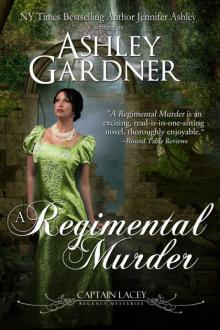 A Regimental Murder
A Regimental Murder Lone Wolf
Lone Wolf Forbidden Taste
Forbidden Taste Red Wolf
Red Wolf The Madness of Lord Ian Mackenzie
The Madness of Lord Ian Mackenzie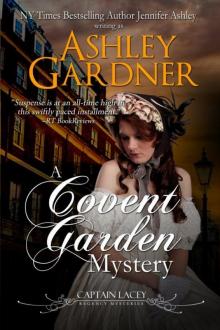 A Covent Garden Mystery
A Covent Garden Mystery The Pirate Next Door
The Pirate Next Door Past Crimes: A Compendium of Historical Mysteries
Past Crimes: A Compendium of Historical Mysteries Highlander Ever After
Highlander Ever After The Alexandria Affair
The Alexandria Affair A Shifter Christmas Carol
A Shifter Christmas Carol The Devilish Lord Will
The Devilish Lord Will Adam
Adam Kyle (Riding Hard Book 6)
Kyle (Riding Hard Book 6) A Body in Berkeley Square
A Body in Berkeley Square The Mad, Bad Duke
The Mad, Bad Duke Mate Claimed
Mate Claimed A Mackenzie Clan Christmas
A Mackenzie Clan Christmas The Seduction of Elliot McBride
The Seduction of Elliot McBride The Glass House
The Glass House Iron Master (Shifters Unbound Book 12)
Iron Master (Shifters Unbound Book 12) A Mackenzie Family Christmas: The Perfect Gift
A Mackenzie Family Christmas: The Perfect Gift Scandal Above Stairs_A Below Stairs Mystery
Scandal Above Stairs_A Below Stairs Mystery Perfect Mate
Perfect Mate Murder in the East End
Murder in the East End Snowbound in Starlight Bend
Snowbound in Starlight Bend Hard Mated
Hard Mated Murder in St. Giles
Murder in St. Giles Alec Mackenzie's Art of Seduction
Alec Mackenzie's Art of Seduction A MacKenzie Clan Gathering
A MacKenzie Clan Gathering Tyler
Tyler Lady Isabella's Scandalous Marriage
Lady Isabella's Scandalous Marriage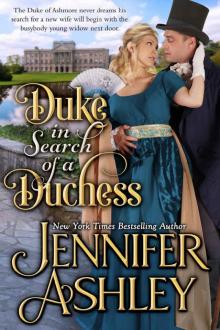 Duke in Search of a Duchess: Sweet Regency Romance
Duke in Search of a Duchess: Sweet Regency Romance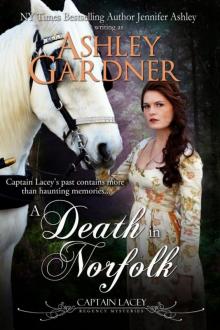 A Death in Norfolk
A Death in Norfolk Give Me One Night (McLaughlin Brothers Book 4)
Give Me One Night (McLaughlin Brothers Book 4) Iron Master
Iron Master The Many Sins of Lord Cameron
The Many Sins of Lord Cameron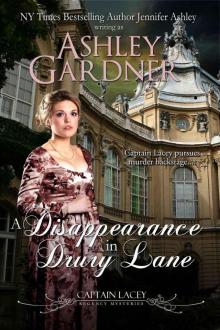 A Disappearance in Drury Lane
A Disappearance in Drury Lane Never Say Never (McLaughlin Brothers Book 3)
Never Say Never (McLaughlin Brothers Book 3) Death in Kew Gardens
Death in Kew Gardens Ross: Riding Hard, Book 5
Ross: Riding Hard, Book 5 Ray: Riding Hard
Ray: Riding Hard A Soupçon of Poison
A Soupçon of Poison Tiger Magic
Tiger Magic The Pirate Hunter's Lady
The Pirate Hunter's Lady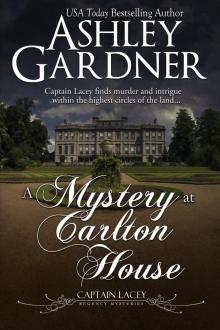 A Mystery at Carlton House
A Mystery at Carlton House The Necklace Affair
The Necklace Affair Wolf Hunt
Wolf Hunt Scandal and the Duchess
Scandal and the Duchess Kyle
Kyle Why Don't You Stay? ... Forever (McLaughlin Brothers Book 2)
Why Don't You Stay? ... Forever (McLaughlin Brothers Book 2) Bear Attraction
Bear Attraction The Gathering
The Gathering A Mackenzie Yuletide
A Mackenzie Yuletide Wild Things (Shifters Unbound #7.75)
Wild Things (Shifters Unbound #7.75) The Redeeming
The Redeeming The Seduction of Elliot McBride hp-5
The Seduction of Elliot McBride hp-5 Death at the Crystal Palace
Death at the Crystal Palace Mackenzie Family Christmas: The Perfect Gift (highland pleasures)
Mackenzie Family Christmas: The Perfect Gift (highland pleasures) Forbidden Taste: A Vampire Romance (Immortals)
Forbidden Taste: A Vampire Romance (Immortals) Care and Feeding of Pirates
Care and Feeding of Pirates Shifter Made (shifters unbound)
Shifter Made (shifters unbound) Dark and Dangerous: Six-in-One Hot Paranormal Romances
Dark and Dangerous: Six-in-One Hot Paranormal Romances The Duke’s Perfect Wife hp-4
The Duke’s Perfect Wife hp-4 The Seduction of Elliot McBride (Mackenzies Series)
The Seduction of Elliot McBride (Mackenzies Series) Lady Isabella's Scandalous Marriage hp-2
Lady Isabella's Scandalous Marriage hp-2 BodyGuard (Butterscotch Martini Shots Book 2)
BodyGuard (Butterscotch Martini Shots Book 2) The Wicked Deeds of Daniel Mackenzie hp-6
The Wicked Deeds of Daniel Mackenzie hp-6 Tiger Magic su-5
Tiger Magic su-5 The Madness Of Lord Ian Mackenzie hp-1
The Madness Of Lord Ian Mackenzie hp-1 Alec Mackenzie's Art of Seduction: Mackenzies (Mackenzies Series Book 9)
Alec Mackenzie's Art of Seduction: Mackenzies (Mackenzies Series Book 9) Mackenzie Family Christmas: The Perfect Gift
Mackenzie Family Christmas: The Perfect Gift Bodyguard (Shifters Unbound #2.5)
Bodyguard (Shifters Unbound #2.5) Midnight Wolf (A Shifters Unbound Novel)
Midnight Wolf (A Shifters Unbound Novel) White Tiger (A Shifter's Unbound Novel)
White Tiger (A Shifter's Unbound Novel) Cowboys Last All Night
Cowboys Last All Night Pride Mates su-1
Pride Mates su-1 Hard Mated (shifters unbound )
Hard Mated (shifters unbound ) Bodyguard (shifters unbound )
Bodyguard (shifters unbound ) Snowbound in Starlight Bend: A Riding Hard Novella
Snowbound in Starlight Bend: A Riding Hard Novella The Untamed Mackenzie (highland pleasures)
The Untamed Mackenzie (highland pleasures) The Untamed Mackenzie (Mackenzies Series)
The Untamed Mackenzie (Mackenzies Series)![Highland Pleasures [6] The Wicked Deeds of Daniel Mackenzie Read online](http://i1.bookreadfree.com/i2/04/07/highland_pleasures_6_the_wicked_deeds_of_daniel_mackenzie_preview.jpg) Highland Pleasures [6] The Wicked Deeds of Daniel Mackenzie
Highland Pleasures [6] The Wicked Deeds of Daniel Mackenzie Lone Wolf (shifters unbound)
Lone Wolf (shifters unbound)![Shifters Unbound [5] Tiger Magic Read online](http://i1.bookreadfree.com/i2/04/11/shifters_unbound_5_tiger_magic_preview.jpg) Shifters Unbound [5] Tiger Magic
Shifters Unbound [5] Tiger Magic Tyler (Riding Hard Book 4)
Tyler (Riding Hard Book 4) Ross
Ross Bad Boys of the Night: Eight Sizzling Paranormal Romances: Paranormal Romance Boxed Set
Bad Boys of the Night: Eight Sizzling Paranormal Romances: Paranormal Romance Boxed Set From Jennifer Ashley, With Love: Three Paranormal Romances from Bestselling Series
From Jennifer Ashley, With Love: Three Paranormal Romances from Bestselling Series The Longest Night: Fantasy Romance (Nvengaria Book 4)
The Longest Night: Fantasy Romance (Nvengaria Book 4) The Many Sins of Lord Cameron hp-3
The Many Sins of Lord Cameron hp-3 Mate Claimed su-4
Mate Claimed su-4